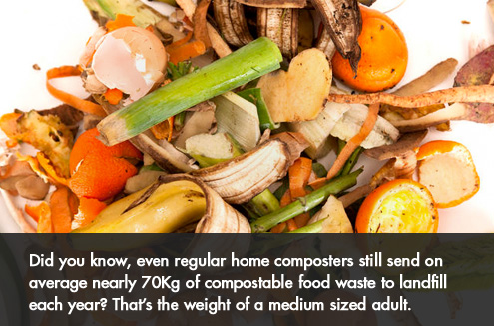
Why compost?
Composting is an inexpensive, natural process that transforms your kitchen and garden waste into a valuable and nutrient rich food for your garden. It’s easy to make and use.
“Just like you I am keen to do my bit for the environment and at the same time help my garden. All you need to do is follow the advice on this website and you too can get the best out of your bin and start giving Mother Nature a helping hand”
– Philippa Forrester
Environmental reasons
Do your bit to reduce the amount of waste sent to landfill. Even for households that are already composting, new research has found that almost half of the food waste in their rubbish bins could have been composted.
Did you know, composting at home for just one year can save global warming gases equivalent to all the CO2 your kettle produces annually, or your washing machine produces in three months?
We’re often asked “Why do I need to compost when my waste will break down in landfill anyway?”
When waste is sent to landfill, air cannot get to the organic waste. Therefore as the waste breaks down it creates a harmful greenhouse gas, methane, which damages the Earth’s atmosphere. However, when this same waste is composted above ground at home, oxygen helps the waste to decompose aerobically which means hardly any methane is produced, which is good news for the planet. And what’s more, after nine to twelve months, you get a free fertiliser for your garden and plant pots to keep them looking beautiful.
Benefits for your garden
Your compost is a nutrient-rich food product for your garden and will help improve soil structure, maintain moisture levels, and keep your soil’s PH balance in check while helping to suppress plant disease. It will have everything your plants need including nitrogen, phosphorus and potassium and it will help buffer soils that are very acidic or alkaline. Compost improves your soil’s condition and your plants and flowers will love it!
What can I put in my Bin?
“GREENS”
Quick to rot and provide important nitrogen and moisture.
- Tea bags
- Grass cutting
- Vegetable peelings, salad leaves and fruit scraps
- Old flowers and nettles
- Coffee grounds and filter paper
- Spent bedding plants
- Rhubarb leaves
- Young annual weeds (e.g. chickweed)
“BROWNS”
Slower to rot, provide carbon & fibre and allow air pockets to form.
- Cardboard
- Egg boxes
- Scrunched up paper
- Fallen leaves
- Sawdust
- Twigs, branches and bark
KEEP THIS OUT!
Certain things should never be placed in your bin.
- Meat
- Cooked vegetables
- Dairy products
- Diseased plants
- Dog poo or cat litter
- Nappies
- Perennial weeds or weeds with seed heads
Much more information: RecycleNow
